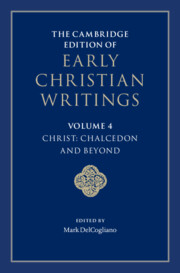Book contents
- The Cambridge Edition of Early Christian Writings
- The Cambridge Edition of Early Christian Writings
- The Cambridge Edition of Early Christian Writings
- Copyright page
- Contents
- Notes on Contributors
- Acknowledgments
- Note on the Texts and Translations
- Abbreviations
- Series Introduction
- Introduction
- Part I The Council of Chalcedon and Its Reception
- Part II Christological Perspectives after Constantinople II
- 20 Emperor Justin II, The Second Henotikon
- 21 Gregory the Great, Selections from his Homilies
- 22 Gregory the Great, Letters 1.24, 10.21, and 11.52
- 23 Anonymous Apology for Narsai
- 24 Babai the Great, On the Union 9 and 17
- 25 Sophronius of Jerusalem, Synodical Letter 1.6 and 3.1–17
- 26 Ekthesis of Emperor Heraclius
- 27 Maximus the Confessor, Ambiguum 31 to John
- 28 Maximus the Confessor, Ambiguum 5 to Thomas
- 29 Maximus the Confessor, Opusculum 3
- 30 Maximus the Confessor, Opusculum 6
- 31 Maximus the Confessor, Opusculum 7
- 32 Typos of 647/8
- 33 Acts of the Lateran Synod (October 649): Selected Proceedings and the Synodal Definition
- 34 Acts of the Third Council of Constantinople (680–681): Selected Proceedings and the Synodal Definition
- 35 John of Damascus, On Composite Nature against the Leaderless
- 36 John of Damascus, On the Faith against the Nestorians
- 37 John of Damascus, An Exact Exposition of the Orthodox Faith 57–58
- Suggestions for Further Reading
- Scriptural Index
22 - Gregory the Great, Letters 1.24, 10.21, and 11.52
from Part II - Christological Perspectives after Constantinople II
Published online by Cambridge University Press: 11 February 2022
- The Cambridge Edition of Early Christian Writings
- The Cambridge Edition of Early Christian Writings
- The Cambridge Edition of Early Christian Writings
- Copyright page
- Contents
- Notes on Contributors
- Acknowledgments
- Note on the Texts and Translations
- Abbreviations
- Series Introduction
- Introduction
- Part I The Council of Chalcedon and Its Reception
- Part II Christological Perspectives after Constantinople II
- 20 Emperor Justin II, The Second Henotikon
- 21 Gregory the Great, Selections from his Homilies
- 22 Gregory the Great, Letters 1.24, 10.21, and 11.52
- 23 Anonymous Apology for Narsai
- 24 Babai the Great, On the Union 9 and 17
- 25 Sophronius of Jerusalem, Synodical Letter 1.6 and 3.1–17
- 26 Ekthesis of Emperor Heraclius
- 27 Maximus the Confessor, Ambiguum 31 to John
- 28 Maximus the Confessor, Ambiguum 5 to Thomas
- 29 Maximus the Confessor, Opusculum 3
- 30 Maximus the Confessor, Opusculum 6
- 31 Maximus the Confessor, Opusculum 7
- 32 Typos of 647/8
- 33 Acts of the Lateran Synod (October 649): Selected Proceedings and the Synodal Definition
- 34 Acts of the Third Council of Constantinople (680–681): Selected Proceedings and the Synodal Definition
- 35 John of Damascus, On Composite Nature against the Leaderless
- 36 John of Damascus, On the Faith against the Nestorians
- 37 John of Damascus, An Exact Exposition of the Orthodox Faith 57–58
- Suggestions for Further Reading
- Scriptural Index
Summary
Gregory the Great was pope from 590 to 604. Much of what is known about his papacy comes from the collection of his letters, called the Registrum epistularum, that was assembled after his death. Over 850 of his letters survive, to a vast array of addressees on an equally vast array of subjects. Three are translated here. The first is Letter 1.24, the encyclical letter that Gregory sent in February 591 to the patriarchs of Constantinople, Alexandria, Antioch, and Jerusalem shortly after his elevation to the papacy, as a token of his communion with them. While the bulk of the letter deals with pastoral concerns, its last paragraph (translated below) contains a profession of faith meant to assure his fellow patriarchs of his orthodoxy. Here Gregory confesses his adherence to Nicaea, Constantinople, Ephesus I, Chalcedon, and Constantinople II with its condemnation of the Three Chapters.
- Type
- Chapter
- Information
- The Cambridge Edition of Early Christian Writings , pp. 405 - 414Publisher: Cambridge University PressPrint publication year: 2022

